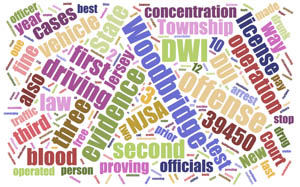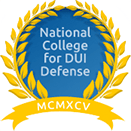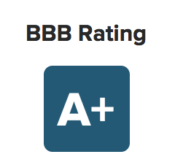 With major highways like the Garden State Parkway, the New Jersey Turnpike, U.S. Highway 1 and Route 9 all converging in Woodbridge Township, it is not surprising that it hears more DWI cases than almost all courts in the state. Both the Woodbridge Police Department and New Jersey State Police are vigilant in identifying intoxicated drivers who violate N.J.S.A. 39:4-50. In the last reported year alone, Woodbridge Township Municipal Court heard over 350 DUI complaints.
With major highways like the Garden State Parkway, the New Jersey Turnpike, U.S. Highway 1 and Route 9 all converging in Woodbridge Township, it is not surprising that it hears more DWI cases than almost all courts in the state. Both the Woodbridge Police Department and New Jersey State Police are vigilant in identifying intoxicated drivers who violate N.J.S.A. 39:4-50. In the last reported year alone, Woodbridge Township Municipal Court heard over 350 DUI complaints.
Each and every one of those charges carried some form of driver’s license suspension whether the matter involved a first offense, second offense or third offense. If you have been charged with DWI or driving under the influence of drugs (e.g. marijuana, heroin, prescription medication, etc.), our Woodbridge Defense Firm has exceptional qualifications for defending you. We not only employ several former prosecutors but also multiple attorneys who are dual certified on the Alcotest and in Standardized Field Sobriety Testing. Our lawyers handle so many DUI violations that we are among 2 or 3 firms in the entire state that own their own breath test machine. To learn how we can help you win your DWI case, call us for a free consultation.
Charged With DUI In Woodbridge Township
Under N.J.S.A. 39:4-50, a person is guilty of DWI if they operate a vehicle “while under the influence of intoxicating liquor, narcotic, hallucinogenic or habit-producing drug, or…with a blood alcohol concentration of 0.08% or more.” In order to prove a case under this law, the prosecutor must prove two elements, operation and intoxication. The element of operation is rarely in contention. The reason for this is that the prosecution has essentially three ways of proving that a person operated the vehicle in question prior to arrest. The first of these is direct evidence, i.e. the arresting officer witnessed the accused driving the vehicle and made a traffic stop. The second way is through admission by the driver that he operated the vehicle prior to the traffic stop. The last way of proving operation is through circumstantial evidence. The most common circumstantial evidence in DWI/DUI cases is something short of a witness to operation, namely, other circumstances supporting the fact that it occurred. For example, when police arrive at the scene of an accident and the only individual in the area is the owner of the vehicle, this is circumstantial evidence of operation by the owner. As for intoxication, the prosecutor has three (3) primary methods for proving a N.J.S.A. 39:4-50 offense. The three (3) are a blood test, breathalyzer reading or field sobriety tests. Field sobriety tests are familiar to most people as the tests that ask you to recite the alphabet, walk a straight line, balance on one foot, or touch your finger to your nose. The methodology for using the breathalyzer, though, as used by law enforcement in our state may be less familiar. Based on the landmark NJ Supreme Court case of State v. Chun, the results of the Alcotest 7110 device, the breathalyzer used by our State’s law enforcement officials, are admissible as evidence of intoxication. This evidence is only admissible, however, if the law enforcement officials follow a very specific protocol. Often law enforcement officials fail to properly administer this test and our attorneys have in depth training to identify when this occurs and the best way to eliminate the BAC reading from evidence. We are skilled in mounting similar challenges to blood test results.
Penalties That Apply To Your Driving While Intoxicated Offense
The penalties for a first offense under N.J.S.A. 39:4-50 hinge on the blood alcohol concentration (“BAC”) place into evidence in Woodbridge Municipal Court. Where the BAC is at least .08% but less than .10%, a first offense will result in a license suspension of 3 months and a fine between $250 and $400. Where the blood alcohol concentration is above .10%, the period of license revocation is 7 to 12 months, and the fine is $300 to $500. An individual found guilty of their first DWI is also required to perform 12 hours of alcohol education through the Intoxicated Drivers Resource Center (IDRC) and pay a surcharge of $1,000 per year for three (3) years. For a second or third offense, the penalties are worse. A second DWI includes a 2 year drivers license suspension, a fine of $500.00 to $1,000.00, two (2) to ninety (90) days in jail, 30 days of community service, and forty eight (48) hours in the IDRC. The installation of an ignition interlock is also mandatory for a second offense, as is the annual surcharge of $1,000 for three years. For a third or subsequent offense, an individual is required to serve 180 days in jail, pay a fine of $1,000, and have his or her license suspended for 10 years. This is also an annual surcharge of $1,500 for three years.
Woodbridge DWI Lawyer
Since New Jersey has outlawed plea bargaining in DWI cases, the only way for you to avoid the penalties set forth in N.J.S.A. 39:4-50 is to successfully fight the first, second or third offense you are facing. Our staff is uniquely qualified in DWI, DUI and driving under the influence of drug defense. In most cases, our attorneys have far more training in drunk driving than the officer who made the arrest. We know the ins and outs of driving while intoxicated and the best strategies for obtaining dismissals and downgrades. If you have been charged with a DWI in Woodbridge Township, do not hesitate to contact us for a free consultation.











